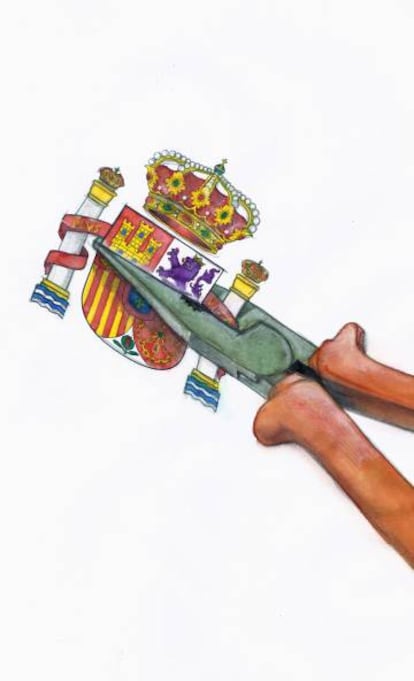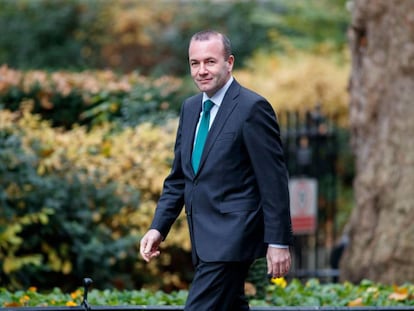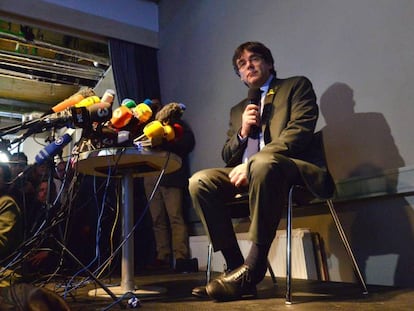Subduing the State
What happened in Catalonia in September and October could never have occurred if secessionists had not enjoyed decades of power and public resources to organize the sedition and rise against the State to which they owed their power and allegiance

Once upon a time, there was a generation in Spain of which a few survivors (such as myself) still remain; because we were born shortly before, during, or right after the Civil War, we were dubbed the ¡°Children of the War¡± generation. When the oldest members of that generation, those born between 1930 and 1939, reached the age of political reason, some of them entered the public arena with the aim of closing the door on their parents¡¯ and grandparents¡¯ war, which they described as ¡°a useless fratricidal massacre¡± in a manifesto that was drafted in Barcelona. They demanded not one true nation formed by a single people, but a democratic state that would guarantee the liberties that had been trampled by the rebels¡¯ victory.
That is the reason why, if we start counting from the early 19th century, that was the first generation of Spaniards more concerned about the State than about the Nation, perhaps because the concept of a single, true Spanish nation had been co-opted by the winners of the war; or perhaps because in the 1950s and 60s freedom itself mattered more, infinitely more, than any sense of Spanish identity or feeling of belonging to any of the possible Spains.
All it takes is a reading of the manifestos that they left behind throughout their time in politics and society to understand that this generation, or at least its most politically active members, were largely unconcerned about the Spanish nation, which never showed up in their protests and demands.
When this generation reached what the thinker Ortega once called the middle of the road of life, that is to say their thirties more or less, they found in Catalonia the mirror in which to look, because that was where the State project that they desired was in a more advanced stage of development. It was in Catalonia where, from the late 1960s onward, there were roundtable meetings bringing together communists and Catholics, left-wing and right-wing nationalists, socialists and liberals, and showing the way towards a meeting point for all political forces that might lead to an action plan backed by parties and unions of all stripes and origins.
It would be absolutely laughable, were it not so dramatic, that a group of judges in a German land cannot see in this Catalan pronunciamiento a crime equivalent to high treason
Catalonia is the place where the belief that the dictatorship could only be replaced by a broad pact among democrats really took hold and grew. In our mind, ¡°Catalonia¡± was synonymous with ¡°pact aimed at constructing a democratic Spanish state that will guarantee invididual and collective freedoms and the autonomy of all people, regions and nationalities within Spain.¡±
This was the project that finally triumphed during the tough years that we rightfully call the transition to democracy. It was a pact in which the Catalans ¨C communists, socialists, nationalists, christian democrats, liberals ¨C played a determining role. The voices of Jordi Pujol, Jordi Sol¨¦ Tura, Joan Revent¨®s, Miquel Roca or Anton Ca?ellas, and even Heribert Barrera, not only held this pact together, but were among its most fervent supporters ¨C and there was fervor indeed in their speeches. For a time, it seemed as though the old aspirations of Pere Bosch Gimpera ¨C namely to conceive Spain as a community of people in which Catalans, Basques, Galicians, but also Castilians, Andalusians, Manchegans and all others would be linked by fraternal ties ¨C was about to become a reality.
There is a Spanish saying that ¡°water that has already passed cannot move the mills.¡± And that is so. But the water doesn¡¯t have to block or destroy the mills, either. The mills could stay there, signaling part of the road that we have already walked down in order to reach...what? A few fateful days in September and October forty years later, when Catalan nationalists, using a narrow majority of seats earned with a minority of votes, grievously violated the pact they had sealed, breaking with their own past, which was everyone¡¯s past, and following in the footsteps of the worst Spanish political tradition, made an independence proclamation in violation of the Constitution that they themselves had signed, as well as violating the Catalan charter that had allowed them to govern legitimately for 40 years.
What they termed a Unilateral Declaration of Independence was in fact a civil ¡°pronunciamiento¡± [a military uprising typical of 19th century Spain, Portugal and Latin America]. Up until then, in Spain, pronunciamientos had only been made by the military, a state power always ready to alter the course of politics until its final, absurd coup attempt of February 23, 1981. Because it was always exclusively used by the military, the dictionary definition of pronunciamento provided by the Royal Spanish Academy talks about ¡°a military uprising against the government.¡± But as of October 2017, the word will also mean the civilian liturgy that was followed by Catalan nationalists who, as legitimate holders of state power, rose not against the government but against the very State whose power they held.
In the 1950s and 60s freedom itself mattered more, infinitely more, than any sense of Spanish identity or feeling of belonging to any of the possible Spains
What happened in Catalonia would never have taken place if nationalists had not, for decades, held a state power and abundant public resources to organize the sedition and to rise against the very same State to which they owed their power and allegiance.
It would be absolutely laughable, were it not so dramatic, that a group of judges in a German land cannot see in this Catalan pronunciamiento a crime equivalent to high treason for the reason that the alleged rebels did not manage to subdue the State. Of course they didn¡¯t subdue it; if they had been successful, as was General Primo de Rivera in 1923, the rebels would have already tried or banished anyone who had resisted their aspirations. Instead they failed in their attempt, as did General Sanjurjo in 1932; he became a prisoner and was courtmartialed by the Republic that he had risen against, just like General Armada and General Milans del Bosch and the aides who featured in the last military pronunciamiento in Spain.
That is, until another state power, the Catalan parliament, added a civilian element to the concept of pronunciamiento ¨C a high treason to the State, to its own history and to over half of the Catalan population whom they allegedly represent. For this, the Catalan nationalists who committed it but failed to subdue the State will have to be tried in a civil court.
Santos Juli¨¢ is a historian.
English version by Susana Urra.
Tu suscripci¨®n se est¨¢ usando en otro dispositivo
?Quieres a?adir otro usuario a tu suscripci¨®n?
Si contin¨²as leyendo en este dispositivo, no se podr¨¢ leer en el otro.
FlechaTu suscripci¨®n se est¨¢ usando en otro dispositivo y solo puedes acceder a EL PA?S desde un dispositivo a la vez.
Si quieres compartir tu cuenta, cambia tu suscripci¨®n a la modalidad Premium, as¨ª podr¨¢s a?adir otro usuario. Cada uno acceder¨¢ con su propia cuenta de email, lo que os permitir¨¢ personalizar vuestra experiencia en EL PA?S.
?Tienes una suscripci¨®n de empresa? Accede aqu¨ª para contratar m¨¢s cuentas.
En el caso de no saber qui¨¦n est¨¢ usando tu cuenta, te recomendamos cambiar tu contrase?a aqu¨ª.
Si decides continuar compartiendo tu cuenta, este mensaje se mostrar¨¢ en tu dispositivo y en el de la otra persona que est¨¢ usando tu cuenta de forma indefinida, afectando a tu experiencia de lectura. Puedes consultar aqu¨ª los t¨¦rminos y condiciones de la suscripci¨®n digital.










































